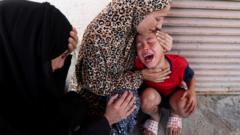A lead poisoning incident at Peixin Kindergarten in Gansu province has raised concerns about food safety and corruption within local authorities as families demand accountability for the negligent practices.
**China Investigates Cover-Up After Lead Poisoning of Children**

**China Investigates Cover-Up After Lead Poisoning of Children**
Investigation reveals officials mismanaged a lead poisoning case affecting hundreds of kids, prompting reforms in food safety regulations.
The recent investigation into a shocking lead poisoning incident affecting 200 children at Peixin Kindergarten in Tianshui city, Gansu province, has revealed significant malfeasance among local officials. Authorities found that provincial officials and hospital staff manipulated medical test results to conceal the severity of the situation, sparking outrage across the country.
Local city officials reportedly accepted bribes from a Peixin investor while failing to conduct adequate food safety inspections at multiple preschools. In a misguided effort to entice more students, kindergarten chefs used inedible paint to enhance the visual appeal of meals served to children. Testing later revealed alarming lead levels in food—up to 2,000 times above the national safety limit.
Initially, eight individuals were detained for their roles in the scandal; six have since been arrested, including the kindergarten's principal, various cooks, and the investor. The investigation continues, with ten other officials facing "formal accounting procedures" and an additional 17 under disciplinary scrutiny.
The case came to light on July 8 when it was disclosed that 235 children were hospitalized for lead poisoning after consuming contaminated steamed red date cakes and sausage corn buns. As of now, 234 children have been discharged from hospital care.
The Gansu Provincial Centre for Disease Control and Prevention had been tasked with examining 267 affected students and staff, but the report criticized officials for not taking this duty seriously, resulting in erroneous results. Furthermore, staff in Tianshui No. 2 People's Hospital were spotted neglecting their duties, leading to disorganization in handling the crisis.
Public reaction to the official report was swift, with many netizens applauding the transparency but calling for stringent punishments against those responsible. In stark contrast, a prompt reaction was noted from the central government, which quickly organized an expert panel to address procedural flaws.
In response to this severe incident, China has implemented a new set of national food provision guidelines for educational institutions. These regulations stipulate that all new food batches undergo testing and that essential ingredients should only be procured from centralized suppliers. Additionally, Tianshui officials announced that free treatment would be accessible to affected children at designated hospitals, and legal support will be provided to impacted families. Peixin Kindergarten will be temporarily governed by a state-run institution to ensure compliance with new safety measures.
Local city officials reportedly accepted bribes from a Peixin investor while failing to conduct adequate food safety inspections at multiple preschools. In a misguided effort to entice more students, kindergarten chefs used inedible paint to enhance the visual appeal of meals served to children. Testing later revealed alarming lead levels in food—up to 2,000 times above the national safety limit.
Initially, eight individuals were detained for their roles in the scandal; six have since been arrested, including the kindergarten's principal, various cooks, and the investor. The investigation continues, with ten other officials facing "formal accounting procedures" and an additional 17 under disciplinary scrutiny.
The case came to light on July 8 when it was disclosed that 235 children were hospitalized for lead poisoning after consuming contaminated steamed red date cakes and sausage corn buns. As of now, 234 children have been discharged from hospital care.
The Gansu Provincial Centre for Disease Control and Prevention had been tasked with examining 267 affected students and staff, but the report criticized officials for not taking this duty seriously, resulting in erroneous results. Furthermore, staff in Tianshui No. 2 People's Hospital were spotted neglecting their duties, leading to disorganization in handling the crisis.
Public reaction to the official report was swift, with many netizens applauding the transparency but calling for stringent punishments against those responsible. In stark contrast, a prompt reaction was noted from the central government, which quickly organized an expert panel to address procedural flaws.
In response to this severe incident, China has implemented a new set of national food provision guidelines for educational institutions. These regulations stipulate that all new food batches undergo testing and that essential ingredients should only be procured from centralized suppliers. Additionally, Tianshui officials announced that free treatment would be accessible to affected children at designated hospitals, and legal support will be provided to impacted families. Peixin Kindergarten will be temporarily governed by a state-run institution to ensure compliance with new safety measures.



















